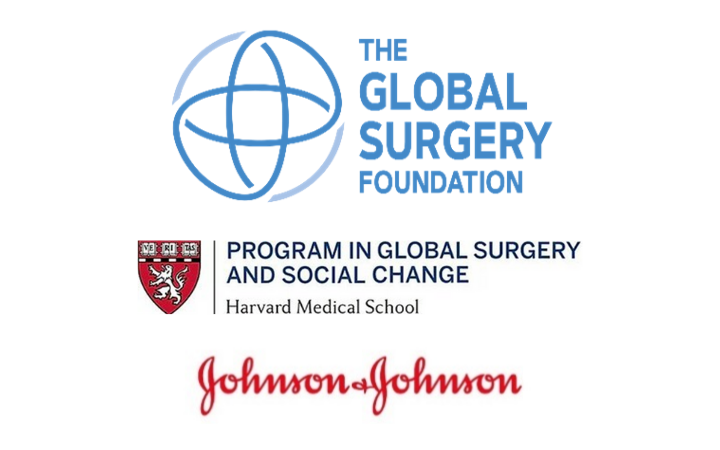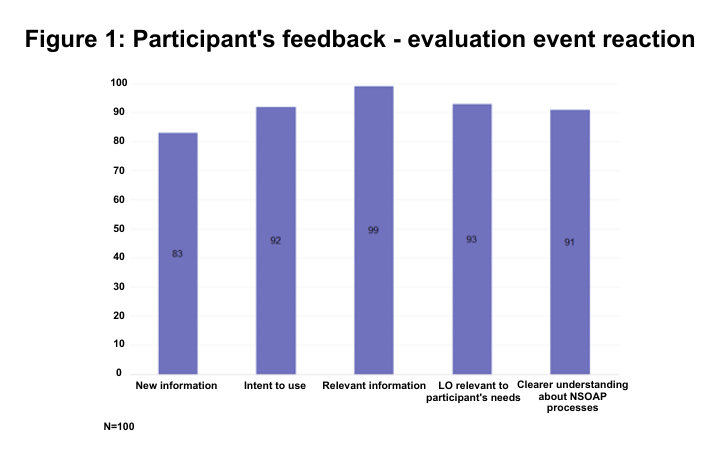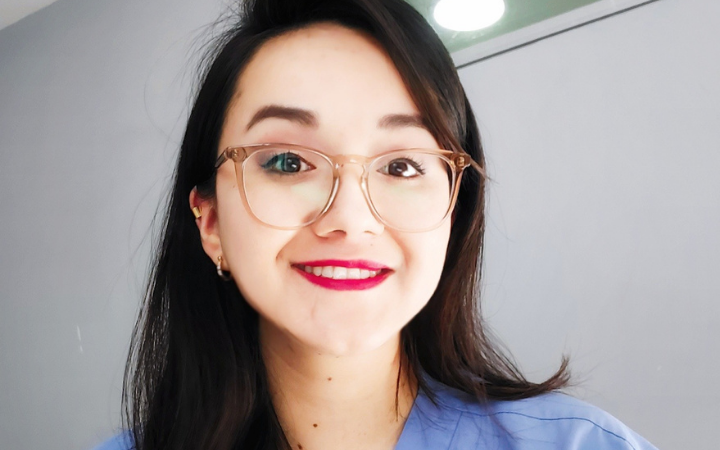Background
Approximately 30 per cent of the global burden of disease is caused by conditions that can be treated by surgery or that require the direct care of a surgeon. Each year, total surgically avertable deaths alone are approximately six times greater than total deaths from HIV, malaria, and TB combined. Yet, 5 million people worldwide do not have access to safe, timely, and affordable surgical care. As part of the Global Surgery initiative's work conducted by the Division for People, the National Surgical Obstetric Anaesthesia Planning (NSOAP) manual was published in collaboration with the Harvard Medical School Program in Global Surgery and Social Change, and the Global Surgery Foundation. The NSOAP manual provides a framework for creating country-specific NSOAPs that can be integrated into the country's national health strategy with the intent of improving the provision of safe surgery, and obstetric and anaesthesia care at a national level.[1] The manual contains a concrete pathway, experiences and lessons learned from implementing countries worldwide to help them increase their capacity to deliver safe and affordable emergency and essential surgical, obstetric and anaesthesia services.
The launch of the manual was organized along with an online educational (learning) series. The series explored the NSOAP process through different lenses, offering stakeholders a unique opportunity to learn more about its benefits. The online learning series consisted of seven sessions covering different aspects of designing and implementing an NSOAP. They were delivered between September 2020 and January 2021. The events included:[2]
- The official publication launch of the NSOAP manual;
- First-hand experience in developing an NSOAP;
- Integrating an NSOAP into national health and pandemic response strategies;
- Donors' perspective on funding NSOAP implementation;
- Ministries of Health perspective on strengthening surgical and anaesthesia care;
- The role of NGOs, academic institutions, professional associations and other non-state actors in supporting the NSOAP process;
- Adopting pragmatic lens: simple steps for translating NSOAP policy into action.
The series reached 3,129 participants through various digital platforms,(Zoom, Facebook live and YouTube). Registered participants (Zoom only) came from 89 countries worldwide, with an even distribution between low-to-middle income countries (49.7 per cent) and upper-to-high income countries (50.3 per cent).[3] Feedback from 100 registered participants indicates a high level of relevance between the series content and the participants' needs. Moreover, 92 per cent indicated a willingness to use the information provided in their jobs.
This Impact Story builds on participants' feedback obtained from a survey conducted by the Programme Unit after the series completion in January 2021 (100 responses), the Institute's Level 3 Kirkpatrick model evaluation survey for 2020 (conducted in May 2021), and two semi-structured interviews[4] conducted by PPME in June 2021.
[1]https://unitar.org/sustainable-development-goals/people/our-portfolio/programme-health-and-development/global-surgery
[2] Recordings of the sessions can be accessed freely on the YouTube channel: https://www.youtube.com/playlist?list=PLQR8YH-YtQS9cxvw9FiIrWUhypOVWvZrN
[3] Narrative report, Division for People
[4] Content from one interview was included in the section: Application and transfer of knowledge and skills from the NSOAP series.
Application and transfer of knowledge and skills from the NSOAP series
This section combines information from the above-mentioned sources. The results illustrate how some of the participants have moved the NSOAP process forward in their countries and the challenges they face in trying to maintain momentum, and applyknowledge and skills from the series in practical terms.
With the exception of one Level 3 survey respondent, participants enrolled in the series to acquire new knowledge and grow in their professional life. In line with Figure 1, they indicated that applying knowledge from the series was (very) important for their professional lives. Participants applied knowledge and skills differently. The changes identified and application of knowledge in the workplace as a result of the learning series can be summarized in six categories, as illustrated below:
- Improvement of data quality and use: As a result of the series, participants have improved the quality of data used in their workplace using recommended approaches from the learning events, as well as data collection and analysis processes.
At my local hospital, we create a multidisciplinary working group between Neonatology and Pediatrics Surgery to improve our quality indicators.
- Emerging NSOAP processes: Five cases were identified where (country) NSOAP processes were, or planned to be, strengthened after the series.
The series will inform the foundation to start the design of the NSOAP for Uganda.
These series have enabled me to take the NSOAP process forward in Nigeria though only through advocacy via social media.
I initially have engaged our country Somaliland, the Ministry of Health Development, and I am still committed to work on it.
- Transfer of knowledge and skills to other professionals: Participants have shared some of the knowledge from the series with colleagues at work (mostly informally) or with their professional networks.
I'm working in a project at the JDN WMA to spread basic concepts of global surgery in Latin America young residents doctors.
I am part of a student organization called Pakistan Global Surgery Student Association, and intend on delivering talks of similar nature to the members of this organization.
- Broaden participants' perspectives on the topic: Participants have increased their understanding of the topic and now have a different perception of the subject matter. One even indicated their plans to pursue a professional path related to the topic in question.
I have a renewed perspective on seeing my future career as a surgeon and global health shaper. I am more open and excited to take part in global surgery projects in the future.
The series informed me of the need for training more surgeons and awareness promotion of gap in surgical accessibility.
- Research activities: In a few cases, information from the NSOAP series helped inform research activities.
The NSOAP has been greatly useful in my research development and getting to understand more about security and peace.
- Incorporation of knowledge in academic lectures: Some participants indicated their willingness to incorporate the knowledge from the series, e.g., basic concepts, into their lectures at medical school. However, for this category, all examples suggest they have not yet done so, but plan on doing it in the future.
I will teach the students.
I will extend the lessons to my university.
The sources of information also suggest that although not all participants have applied knowledge and skills from the series, they are interested in being involved in NSOAP processes in their countries.
I would want to be more involved in the NSOAP process in my country.
Additionally, participants pointed out the challenges that prevented them from applying knowledge and skills from the series as they would like. Box 1 illustrates an example of barriers to applying knowledge and skills from a participant in Kenya. Challenges encountered by participants include:
- Bureaucracy and competing priorities: As NSOAP requires a national effort, not all participants have found the opportunity to engage with national actors who could foster the process, or they have discovered that surgical, obstetric and anaesthesia (SOA) services are not a priority for national stakeholders.
It's very difficult for authorities to prioritise this right now, even though its importance has been stressed several times.
The health system in my country varies as per different states so a national programme won't be possible.
Competing interests/other projects take up time.
- Opportunity to apply knowledge in current work position: Some of the participants enrolled in the series to increase their technical knowledge of the topic, but their area of expertise/work does not allow them to apply the knowledge learned.
As a young medical doctor working in a hospital I cannot establish the NSOAP process but I have enough basic information to share with health professionals that would help.
- Lack of information on the NSOAP process: One example indicated that there was limited information on the progress of the NSOAP process in their country.
There was a presentation on the NSOAP process but it was fairly opaque and limited to only two elite institutions.
Suggestions from participants to overcome these challenges and future considerations include broadening language accessibility of the NSOAP series and materials (e.g., manual), increased exchange between participants, offering courses on fundamentals of global surgery, and organizing national workshops.
Fabiola Castedo
Fabiola Castedo
Resident Doctor - Neonatology, CHPR
Transferring knowledge from the NSOAP series
Montevideo, Uruguay. Fabiola is a resident doctor of neonatology at Centro Hospitalario Pereira Rossel (CHPR) in Uruguay but she is originally from Bolivia. During her studies in Uruguay, Fabiola had an experience at the hospital that made her realize the importance of surgical obstetrician processes and the need to foster these processes in her home country.
During Fabiola's first year of study in Uruguay, she assisted a child delivery that involved gastroschisis. Although this condition was unexpected for the doctors leading the delivery, she was surprised at the efficient pediatric surgery staff response capacity. Fabiola has had a similar experience in a Bolivian hospital, but on this occasion, they could not assist the baby and had to transfer mother and child to another hospital. This experience impacted Fabiola, who decided to learn more about surgical obstetrics and neonatology, which led to her participation in the series.
Before the series, Fabiola was already involved in the Junior Doctors Network (JDN)[5] of the World Medical Association and the International Federation of Medical Students Associations (IFMSA)[6]. Through the JDN, she participates in Global PaedSurg Research, the world's largest prospective cohort study of gastrointestinal congenital anomalies, as Junior Country Lead for Uruguay and during the pandemic she also participated in CovidSurg - Global Surg is a platform of studies which aims to explore the impact of COVID-19 on surgical patients and services. Through those programmes, Fabiola established a multidisciplinary team to focus on neonatal surgical patients in her hospital. Fabiola was able to transfer knowledge from the NSOAP series to her colleagues in the working group. The NSOAP series and manual helped Fabiola in data collection and analysis during the research process. She acknowledges that although they collected data from their patients, the amount of information gathered was huge, but it was neither organized, functional nor useful.
Moreover, in her work at the JDN, she partnered with a colleague from Venezuela to plan a webinar series in Spanish for other junior doctors in Latin America. They aim to present their findings and their experiences, including information from the series, in Spanish. Fabiola considers that a lack of English prevents other junior doctors from engaging in global learning activities, such as the NSOAP series.
Fabiola also considers that the NSOAP series provided her with a broader vision of global surgery, its applicability at national level, and the responsibility that stakeholders in the health sector have to promote global surgery. Indeed, one of the most valuable webinars in the series for her was the one on the role of donors and other strategic partners. Fabiola says that as surgery is sometimes seen as a luxury in Latin America, it is helpful to know about the existence of funding mechanisms to promote accessible surgery.
Fabiola plans to continue focusing on neonatal surgery and nutrition as her two main topics of interest and promoting initiatives that help improve the quality of these services.
Conclusion
This Impact Story showcases the importance and opportunity to foster NSOAP processes, especially in low-and-middle-income countries. While some participants have used or applied the knowledge from the series, others have faced barriers to using/applying the new knowledge.
The examples reviewed suggest that many of the participants who were able to apply the knowledge were involved in relevant-to-the-topic initiatives, including NSOAP processes. Participants have applied knowledge and skills differently, from increased awareness to transfer of knowledge in academic settings (i.e., medical school) and NSOAP processes in their countries. On the other hand, most of the inhibiting factors are related to structures and hierarchies at the national or local level which make it more difficult for participants to take the initiative to lead these processes. As mentioned by some participants, reaching out to relevant stakeholders (e.g., ministries of health) is critical to promote NSOAP processes, especially in low-and-middle-income countries.









